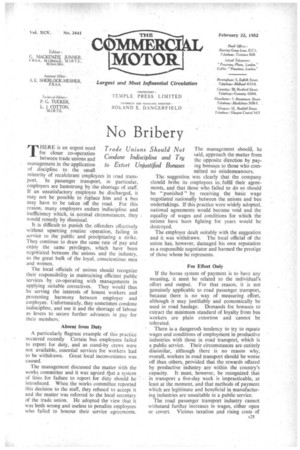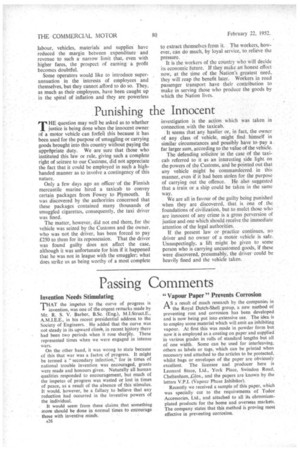No Bribery
Page 27

Page 28

If you've noticed an error in this article please click here to report it so we can fix it.
THERE is an urgent need for closer co-operation between trade unions and management in the application of discipline to the small minority of recalcitrant employees in toad transport. In passenger transport, in particular, employers are hamstrung by the shortage of staff. If an unsatisfactory employee be discharged, it may not be possible to feplace him and a bus may have to be taken off the road. For this reason, many employers endure indiscipline and inefficiency which, in nor.mal circumstances, they would remedy by dismissal.
It is difficult, to punish the offenders effectively without upsetting routine operation, failing in service to the public and precipitating a strike. They continue to draw the same rate of pay and enjoy the same privileges, which have been negotiated between the unions and the industry, as the great bulk of the loyal, conscientious men and women.
The local officials of unions should recognize their responsibility in maintaining efficient public services by co-operating with managements in applying suitable correctives. They would thus be serving the interests of honest workers and promoting harmony between employer and employee. Unfortunately, they sometimes condone indiscipline, and use it and the shortage of labour as levers to secure further advances in pay for their members.
Absent from Duty A particularly flagrant example of this practice occurred recently Certain bus employees failed to report for duty, and as stand-by crews were not available, essential services for workers had to be withdrawn. Great local inconvenience was caused.
The management discussed the matter v'vith the works committee and it was agreed tbat a system of fines for failure to report for duty should be introduced. When the works committee reported this decision to the staff, they refused to accept it and the matter was referred to the local secretary of the trade union. He adopted the view that it was both wrong and useless to penalize employees who failed to honour their service agreements. The management should, he said, approach the matter from the opposite direction by paying bonuses to those who committed no misdemeanours.
The suggestion was clearly that the company should bribe its employees to, fulfil their agreements, and that those who failed to do so should be "punished" by receiving the basic wage negotiated nationally between the unions and bus undertakings. If this practice were widely adopted, national agreements would become void and the equality of wages and conditions for which the unions have been fighting for years would be destroyed.
The employer dealt suitably with the suggestion and it was withdrawn. The local official of the union has, however, damaged his own reputation as a responsible negotiator and harmed the prestige of those whom he represents.
For Effort Only If the bonus system of payment is to have any meaning, it must be related to the individual's effort and output. For that reason, it is not genuinely applicable to road passenger transport, because there is no way of measuring effort, although it may justifiably and economically be used in road haulage. Demands for bonuses to extract the minimum standard of loyalty from bus workers are plain extortion and cannot be tolerated.
There is, a dangerotts tendency to try to equate wages and conditions of employment in productive industries with those in road transport, which is a public service. Their circumstances are entirely dissimilar, although there is no reason why, overall, workers in road transport should be worse off than others, provided that the rewards offered by productive industry are within the country's capacity. It must, however, be recognized that in transport a five-day week is impracticable, at least at the moment, and that methods of payment which are legitimate and beneficial in manufacturing industries are unsuitable in a public service. The road passenger transport industry cannot withstand further increases in wages, either open or covert. Vicious taxation and rising costs of labour, vehicles, materials and supplies have reduced the margin between expenditure and revenue to such a narrow limit that, even with higher fares, the prospect of earning a profit becomes doubtful.
Some operators would like to introduce superannuation in the interests of employees and themselves, but they cannot afford to do so. They, as much as their employees, have been caught up in the spiral of inflation and they are powerless to extract themselves from it. The workers, however, can do much, by loyal service, to relieve the pressure.
It is the workers of the country who will decide its economic future. If they make an honest effort now, at the time of the Nation's greatest need, they will reap the benefit later. Workers in road passenger transport have their contribution to make in serving those who produce the goods by which the Nation lives.




















































































